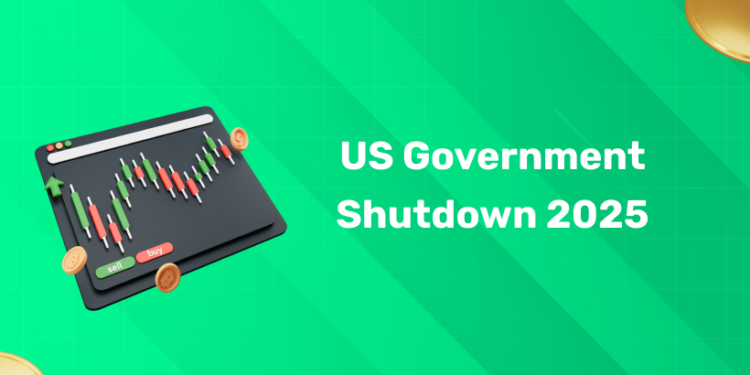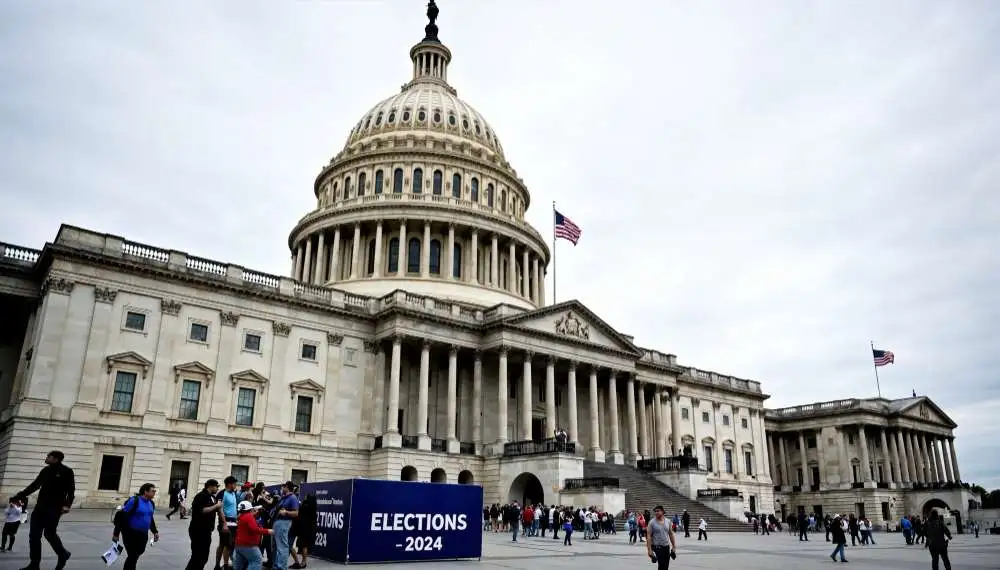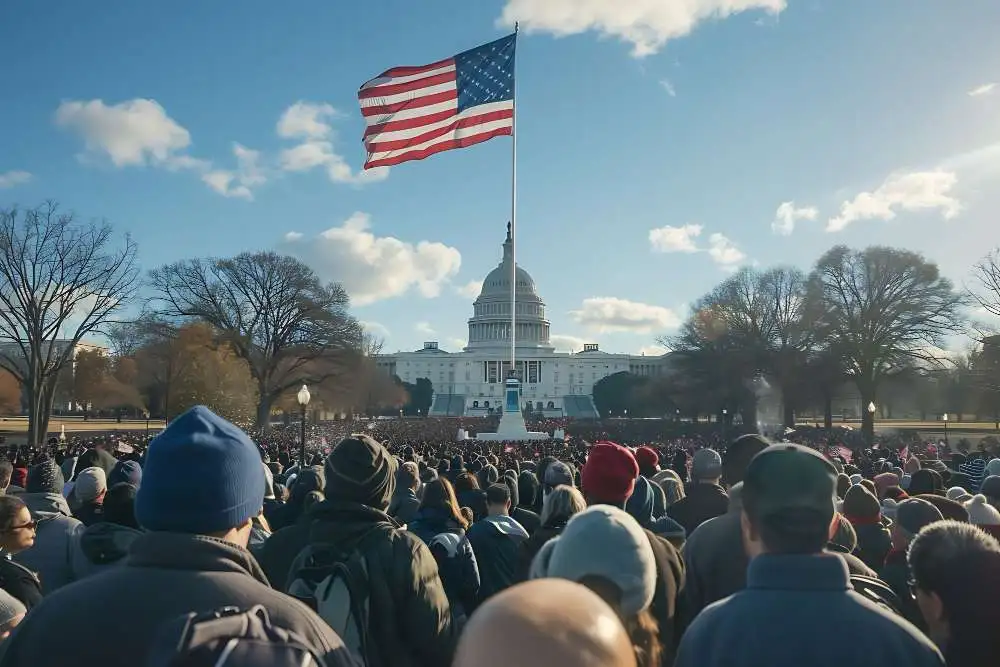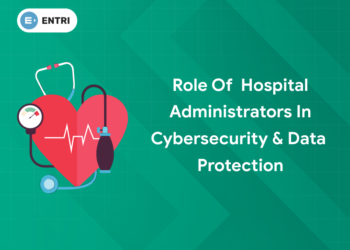Table of Contents
The concept of a US government shutdown might seem distant for many Indian investors, but in the globalized world of finance, such events trigger ripples that travel across oceans and affect markets everywhere. For stock market learners and traders, especially those following global trends, understanding how political impasses like a US government shutdown influence equities, commodities, bonds, and investor sentiment is vital.
This blog explores in detail what a government shutdown means, why it occurs, how it impacts the stock market, immediate and long-term consequences, and what investors can learn from it. We’ll also see how mastering such macroeconomic dynamics can help develop strategic trading insight.
Start investing like a pro. Enroll in our Stock Market course!
Understanding the US Government Shutdown
A US government shutdown happens when Congress fails to pass enough budget legislation to fund federal agencies. This typically occurs due to political disagreements, often over spending priorities or national debt limits.
When the government “shuts down,” it doesn’t mean everything stops entirely; vital services such as national security, emergency assistance, and air traffic control continue to function. However, many non-essential departments close or furlough employees, halting regulatory processes, visa applications, research projects, and more.
For investors, understanding these mechanics isn’t just political literacy; it’s financial strategy. Shutdowns can affect GDP growth, employment data releases, government bonds, and, subsequently, stock market performance.
Reason behind the US Government shutdown
1: What is a stock?
At a practical level, a shutdown occurs when Congress fails to pass funding for federal agencies before the new fiscal year starts (typically 1 October). The 2025 shutdown resulted from a stalemate over appropriations bills and disagreements on major policy riders and spending priorities. Key fault-lines in 2025 included disputes over:
- ACA premium tax credits (enhanced subsidies under the Affordable Care Act), a politically charged item because it affect millions of households’ health insurance costs. Lawmakers debated whether and how to extend these credits and who should pay for them.
- Overall spending levels and priorities, including defence, domestic programmes, and foreign aid, differing views on cuts versus continued spending amplified the impasse.
- Political strategy and leverage in Congress: individual chambers and factions sometimes prefer pushing for specific policy wins before passing a clean continuing resolution. That dynamic can lead to a lapse in funding if an agreement cannot be reached.
Immediate effects: what actually happens when the lights go off
When a shutdown starts, its most immediate impacts are operational and administrative. These effects are what traders should watch first because they change information flow and can create quick moves in certain sectors.
1. Furloughs and staff working without pay
Large numbers of federal employees are either placed on furlough (temporarily sent home) or required to continue working without pay if their roles are considered “essential.” In 2025, government notices and agency contingency plans indicated hundreds of thousands of workers could be furloughed or unpaid, affecting a wide range of federal services. This has immediate local economic effects in government-heavy towns and regions.
2. Suspension or delay of economic data releases
Key government statistical agencies, notably the Bureau of Labor Statistics (BLS), Bureau of Economic Analysis (BEA) and the Census Bureau, often scale back or suspend routine data collection and publication during a shutdown. That means scheduled employment numbers, GDP updates and other official prints may be delayed or released less frequently, creating “data gaps” for investors and policy-makers.
3. Pause or slowdown of government services and programmes
Some discretionary programmes and grant operations pause, while entitlement programmes required by law (e.g. Social Security) typically continue. Yet programmes that depend on annual appropriations like certain nutritional programmes, can face immediate funding stress or operate on reserves for a short time. That affects vendors and companies that supply goods or services to those programmes.
4. Regulatory and transactional delays
Regulatory approvals, patent processing, export licences and other agency actions may be delayed. Financial firms awaiting SEC or other regulator approvals can face timeline uncertainty. Federal contract awards and invoices may be deferred, which matters for large government contractors and certain small businesses.
5. Rapid political noise and headlines
A shutdown invites daily political theatre votes, statements, and “what-if” headlines. That increases intraday news flow and can drive sentiment-based trades, especially in small caps and politically sensitive sectors.
Impact on Global and Indian Stock Markets
While a US government shutdown is largely a domestic issue, its indirect reverberations are felt worldwide because of intertwined financial systems.
- Currency Movement: The US dollar tends to weaken from uncertainty and this can give other world currencies, such as the Indian Rupee, a temporary boost.
- Foreign Institutional Investors (FIIs): Global risk-off sentiment and FIIs pulling out funds from emerging markets like India can cause volatility in indices such as NIFTY and SENSEX.
- Commodity Churn: Crude and gold typically mirror the increased uncertainty. Energy shares, metals in India respond
- IT Sector Exposure: Indian IT companies servicing American clients can get burned by late payments or project disruptions during long shutdowns.
- Investor Sentiment: Retail investors tend to pull back, with short-term trading volumes dropping as long-term investors ride out the volatility.
Being familiar with these dynamics allows traders to both find safe points at which to enter and exit a market, hedge risk in their portfolio, and plan multi-market positions.
How the Shutdown Impacts Investor Psychology
Behavioral finance plays a huge role during such periods. News cycles amplify uncertainty, leading to panic selling or abrupt buying of safe assets. Investors tend to overreact to short-term disruptions, even when fundamental valuations remain strong.
Learning to distinguish between sentiment-driven dips and fundamentally justified declines is a crucial skill for stock market learners. Platforms like the Entri Stock Market Course emphasize mastering behavioral patterns alongside technical and fundamental analysis, helping traders remain rational under pressure.
Stock Market Training Reviewed & Monitored by SEBI Registered RA
Trusted, concepts to help you grow with confidence. Enroll now and learn to start investing the right way.
Know moreHistorical Context: Past Shutdowns and Market Trends
Looking back at history reveals that the stock market’s response to shutdowns is often short-lived:
- 2013 Shutdown (16 Days): The S&P 500 initially dropped slightly but ended up gaining over 3% after operations resumed.
- 2018–2019 Shutdown (35 Days): Despite being the longest in history, markets stabilized within weeks after reopening.
- 2025 Shutdown: Mid-term data shows market stabilization once a funding resolution appears likely.
Historically, these events rarely cause prolonged bear markets. Still, they serve as reminders that governance risk is a real factor in portfolio management.
The Broader Economic Consequences
A US government shutdown affects macroeconomic indicators beyond the trading floor.
- GDP Decline: With federal spending paused, the GDP contracts temporarily, approximately 0.1–0.2 percentage point reductions per week of shutdown.
- Federal Employees’ Paycheck Delays: Around one-third of government employees experience immediate income loss, affecting consumption trends.
- Tourism and Public Access: National parks, museums, and similar public institutions close, undermining service-sector revenues.
- Delayed Policy Implementation: Projects on infrastructure, climate, and research face setbacks, indirectly affecting corporate earnings.
For global investors, these economic ripples redefine short-term sentiment toward US assets, potentially altering foreign exchange trends.
Lessons for Indian Stock Market Learners
For those who are studying or investing in Indian markets, the 2025 US shutdown has some valuable lessons on market behavior and macroeconomic dependence.
- Global Interconnectivity: No market is isolated. Major US events can impact Indian indices to commodity prices.
- Diversification is Key: Don’t overexpose yourself to one geography or asset class. Global uncertainty can balance your portfolio when managed wisely.
- Avoid Panic Trading: Shutdowns create uncertainty not systemic collapse. Follow disciplined trading principles to minimize impulsive losses.
- Focus on Fundamentals: Temporary noise distracts from sound macroeconomic indicators and company fundamentals.
- Volatility as Opportunity: Short-term dips due to such events are buying opportunities for long-term investors.
These are the key takeaways from the Entri Stock Market Course, which teaches you to read market signals, interpret macroeconomic events, and align them with technical chart analysis.
How to Respond to a US Shutdown
Rather than reacting impulsively, here’s how smart investors do:
- Track Correlated Sectors: Focus on sectors least affected by government policies, like healthcare, FMCG or defensive stocks.
- Evaluate Dollar Impact: If the dollar weakens, export-oriented companies may gain, providing opportunities in IT or pharma sectors.
- Study Bond and Treasury Yields: Their movement gives you cues on capital flow directions.
- Avoid Over-leveraging: Volatile environments can turn leveraged positions risky in hours.
- Stay Updated: Use credible financial portals and data sources, not social media hearsay.
Through structured training in the Entri Stock Market Course, you will learn to decode these signals and turn them into actionable insights.
Policy Resolution Outlook for 2025
As of now, US lawmakers are working on short-term continuing resolutions to reopen closed agencies. Analysts say the market will stabilize once spending is clear.
But the bigger lesson is, policy disruptions can happen in any major economy. So adapt and be aware if you are an investor globally.
Key Takeaways
- A US government shutdown happens when Congress fails to pass funding bills, and non-essential services are shut down.
- 2025 shutdown is due to political standoffs over the budget, the debt ceiling and election-year debates.
- Immediate impact is stock market volatility, delayed government data, and lower consumer confidence.
- Indian stock market feels the indirect impact through currency fluctuations, FII withdrawal, and sentiment shift.
- For investors, understanding such macro events helps in making data-driven decisions rather than emotional ones.
- History shows shutdowns rarely have long-term negative impact, but emphasizes the importance of global diversification.
Final Thoughts: Control what you can
A government shutdown is stressful for many and a learning opportunity for traders. The immediate effects of furloughs, delayed data, and government-contract slowdowns change the market information flow and create short-term volatility. Your edge as a learner is a calm and structured response: know the reasons, measure direct exposures, size positions carefully, and practice hedging and rotation in a simulated environment before risking real capital. Courses like Entri’s Stock Market Course are designed to turn these events into hands-on learning: scenario labs, mentor feedback, and risk-management drills that make you better at handling political shocks.
Stock Market Training Reviewed & Monitored by SEBI Registered RA
Trusted, concepts to help you grow with confidence. Enroll now and learn to start investing the right way.
Know moreFrequently Asked Questions
What causes a US government shutdown?
A US government shutdown occurs when Congress fails to pass the federal budget or temporary funding bills due to disagreements over spending priorities or debt limits. This halts non-essential government functions until a resolution is reached.
How does the US government shutdown affect the stock market?
Shutdowns create uncertainty in financial markets, causing volatility in major indices and safe-haven shifts toward bonds or gold. However, historically, markets tend to recover once the government resumes normal operations.
Does the 2025 shutdown impact Indian investors?
Yes. Global risk sentiment influences FII movements, currency exchange rates, and commodity prices. Indian markets often experience short-term volatility when major US political disruptions occur.
What are the immediate effects of a US shutdown on the economy?
Federal employees face pay delays, government services halt, spending decreases, and GDP growth slows temporarily. The lack of data releases also creates uncertainty for policy analysts and investors.
Can investors benefit during a government shutdown?
Strategic investors often view volatility as an opportunity. Well-informed traders use market dips to enter quality stocks at discounts, focusing on long-term fundamentals.
Are government shutdown effects long-lasting?
Typically, no. While short-term volatility increases, most past shutdowns have not resulted in prolonged market downturns. Markets stabilize once political agreements are reached














